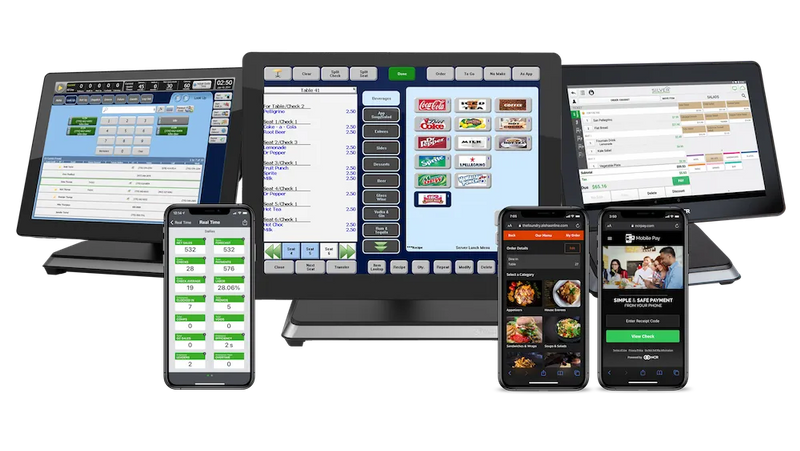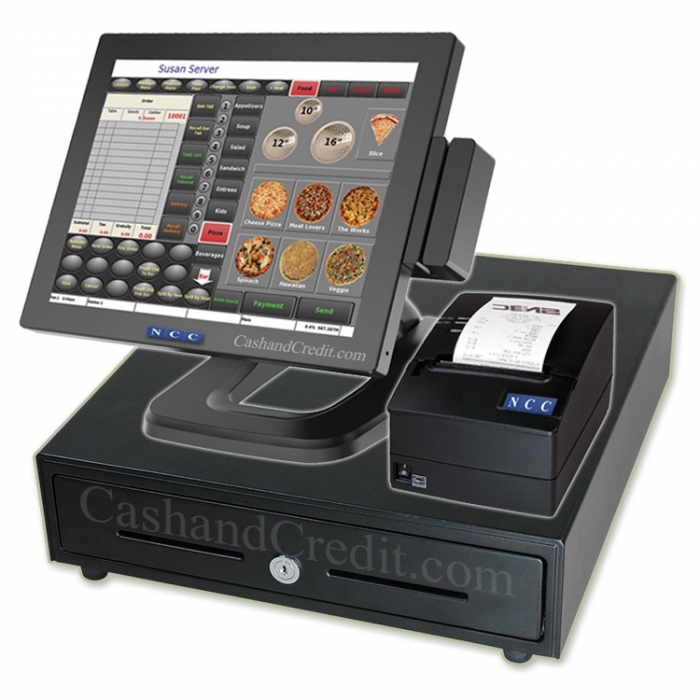Comprehending the Relevance of POS Software in Modern Retail Workflow
In today's retail landscape, the role of POS software has ended up being increasingly considerable. These systems have actually changed from basic sales register to multifaceted devices that enhance different facets of operations. They not only improve purchases yet additionally give understandings that can form service strategies. Comprehending just how these systems effect consumer experience and inventory administration is crucial for any kind of retailer seeking to continue to be affordable. The implications of these developments call for further exploration.
The Evolution of POS Software: From Deal Handling to Comprehensive Solutions

Enhancing Customer Experience With Advanced POS Features

Enhancing Supply Administration With Integrated POS Systems
Integrated POS systems play an essential role in simplifying inventory monitoring by automating processes that traditionally called for significant manual effort. These systems enable merchants to track inventory levels in real time, removing discrepancies that typically occur from hands-on supply counts. With attributes such as barcode scanning and automated stock replenishment notifies, services can maintain excellent inventory degrees without overstocking or stockouts.Furthermore, integrated POS systems facilitate precise forecasting by evaluating historical sales data, enabling merchants to make enlightened purchasing choices. This anticipating capability aids services adapt to changing customer demands and seasonal patterns extra effectively.Additionally, the centralization of inventory information throughout numerous sales channels improves visibility, allowing merchants to manage their stock a lot more efficiently. Eventually, the assimilation of POS systems into stock administration streamlines procedures, decreases human mistake, and adds to enhanced success.
Real-Time Sales Tracking and Reporting for Informed Decision-Making

Precise stock monitoring prepares for efficient sales monitoring and reporting. Real-time sales tracking enables merchants to check sales efficiency as it takes place, giving instant understandings right into consumer purchasing patterns and trends. This capacity permits businesses to react quickly to fluctuations in need, optimizing supply degrees and minimizing overstock or stockouts.Moreover, integrated POS systems assist in the generation of in-depth records, highlighting key metrics such as sales by category, period, and specific products. Such coverage capacities equip merchants to make data-driven choices, recognizing successful strategies and areas requiring enhancement.
The Role of POS Software in Customer Connection Administration
POS software plays an important duty in improving consumer connection management by allowing retailers to carry out customized advertising methods. By evaluating customer information, businesses can tailor promos and interactions to meet specific preferences. Additionally, these systems promote the advancement of boosted loyalty programs that urge repeat organization and reinforce customer involvement.
Personalized Advertising And Marketing Approaches
As stores increasingly seek to enhance consumer loyalty and interaction, individualized advertising and marketing strategies have actually emerged as a crucial part of effective client relationship administration. POS software plays an important function in this procedure by collecting and assessing client data, allowing sellers to customize advertising and marketing initiatives to individual choices and shopping habits. By leveraging understandings from acquisition histories, sellers can develop targeted promotions and customized communications that reverberate with customers, promoting a deeper link. In addition, the combination of POS software with customer partnership monitoring systems permits seamless monitoring of consumer communications, ensuring that advertising techniques continue to be relevant and prompt (Restaurant POS Software). This data-driven method not just boosts consumer complete satisfaction however also drives sales and urges repeat business, solidifying the merchant's market setting
Enhanced Commitment Programs
Stores are significantly identifying the relevance of loyalty programs in fostering long-term client connections and improving overall involvement. POS software plays an important function in the growth and administration of these programs, enabling retailers to track customer purchases, choices, and actions efficiently. By leveraging information analytics, organizations can develop customized rewards and incentives that resonate with individual clients, therefore increasing participation in loyalty programs. In addition, POS systems make it possible for smooth assimilation with mobile apps and electronic systems, assisting in simple access to benefits and promos. This not only improves client satisfaction however likewise drives repeat company. Ultimately, POS software encourages sellers to cultivate deeper connections with their clientele, changing periodic customers into devoted customers via targeted and significant engagement approaches.
Incorporating POS Systems With Shopping Operating Systems for Omnichannel Success
To accomplish real omnichannel success, seamless assimilation in between point-of-sale (POS) systems and shopping platforms is important. This combination allows sellers to link their inventory administration, making sure that item availability is properly mirrored throughout both online and physical shops. Consumers take advantage of a natural shopping experience, where they can quickly switch over between networks without encountering discrepancies.Furthermore, incorporated systems facilitate real-time data sharing, allowing companies to analyze client habits and choices a lot more successfully. This data-driven method permits sellers to tailor marketing approaches and optimize supply degrees, inevitably enhancing consumer complete satisfaction and driving sales.Additionally, the capability to process purchases throughout platforms streamlines procedures, minimizing the danger of mistakes and boosting overall efficiency. As stores significantly embrace omnichannel methods, the assimilation of POS systems with e-commerce platforms continues to be an important factor in attaining sustainable development and maintaining affordable advantage in the dynamic retail landscape.
Future Fads in POS Technology and Their Effect On Retail Operations
As retail operations advance, future fads in POS innovation are readied to improve the landscape substantially. The increase of cloud-based options, innovations in mobile POS systems, and the benefits of AI integration are among the crucial growths expected to improve efficiency and client experience. These improvements promise to streamline procedures and promote an extra vibrant retail setting.
Cloud-Based Solutions Surge
With the boosting reliance on innovation, cloud-based POS solutions are changing retail operations by offering enhanced flexibility and scalability. These systems make it possible for retailers to access real-time data from anywhere, promoting far better decision-making and client service. By leveraging cloud infrastructure, services can reduce upfront costs related to equipment and software installations while ensuring smooth updates and upkeep. In addition, cloud-based solutions sustain multi-location management, enabling merchants to over at this website integrate stock and sales throughout numerous electrical outlets easily. This versatility is important in today's fast-paced market, where customer preferences shift quickly. As more merchants adopt these options, they can expect better functional effectiveness and a much more responsive method to market demands, eventually boosting customer contentment and commitment.
Mobile POS Innovations
The development of retail technology remains to shape operations, particularly with the rise of mobile POS developments. These systems enable sellers to process transactions anywhere within the store, enhancing consumer engagement and improving from this source check out procedures. Mobile POS services boost stock monitoring by permitting instant accessibility to supply degrees, aiding team aid clients a lot more efficiently. In addition, they promote customized shopping experiences through incorporated client information and commitment programs. As smart phones become significantly advanced, retailers are taking on attributes such as contactless repayments and electronic invoices, in addition maximizing the acquiring journey. The change in the direction of mobile POS not just improves operational performance however likewise lines up with the growing consumer preference for convenience, guaranteeing that stores remain affordable in a rapidly progressing market.
AI Integration Advantages
AI integration stands for a transformative leap in POS modern technology, using stores a myriad of advantages that enhance operational effectiveness and customer experience. By leveraging artificial intelligence formulas, sellers can evaluate buying patterns and enhance stock administration, minimizing waste and stockouts. In addition, AI-powered analytics provide tailored marketing suggestions, allowing targeted promotions that enhance client engagement and loyalty. Chatbots and virtual aides streamline consumer solution, enabling for quicker resolution of queries and enhancing the general purchasing experience. Anticipating analytics can also anticipate demand fads, allowing smarter staffing and resource allowance. Inevitably, the combination of AI in POS systems empowers merchants to make data-driven choices, fostering an one-upmanship in an ever-evolving retail landscape.
Regularly Asked Concerns
What Are the Expenses Connected With Applying POS Software?
The costs connected with implementing POS software can consist of software licensing costs, equipment expenses, setup fees, training prices, and continuous maintenance. Each variable adds to the general financial investment essential for an effective implementation.
Exactly How Can Tiny Retailers Take Advantage Of POS Systems?
Little retailers can benefit Source from POS systems through boosted purchase effectiveness, structured stock management, and enhanced client understandings. These systems enable much better decision-making, eventually resulting in enhanced sales and customer complete satisfaction in competitive markets.
What Equipment Is Required for a POS System?
A common POS system needs essential hardware components, consisting of a touchscreen screen, money drawer, barcode scanner, invoice printer, and repayment terminal. These components interact to help with reliable deal processing and inventory monitoring for sellers.

Can POS Software Be Personalized for Details Retail Demands?
POS software can certainly be tailored to meet certain retail demands. Restaurant POS Software. This adaptability permits services to customize features, interfaces, and coverage devices, improving functional effectiveness and offering a more individualized experience for both team and clients
Exactly How Protected Is Client Information in POS Systems?
The safety and security of customer data in POS systems varies extensively. Lots of systems implement file encryption, safe accessibility controls, and routine updates, however susceptabilities can still exist, necessitating ongoing caution and positive actions from stores to shield sensitive details.